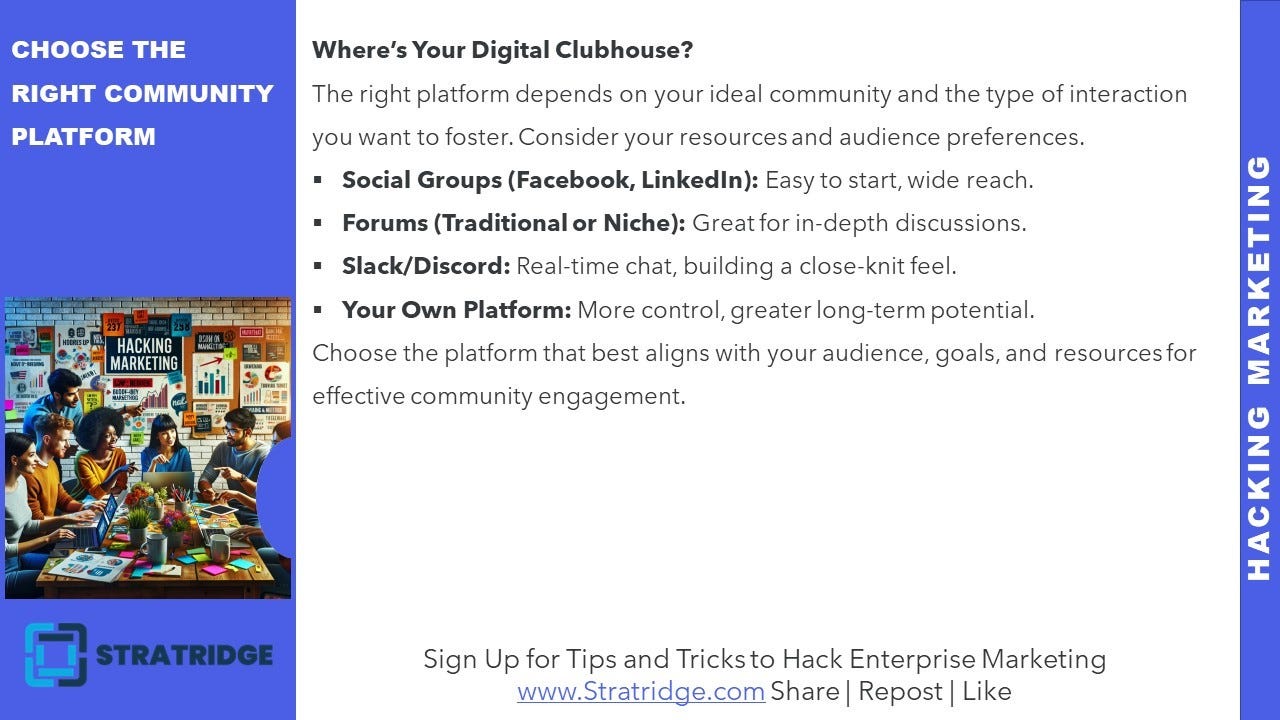In the digital age, where virtual spaces dominate personal and professional interactions, selecting the right platform for your community is paramount. This decision can significantly influence the level of engagement, the quality of discussions, and the overall cohesion of your community. The ideal platform for your community depends heavily on the nature of the interactions you wish to foster, your audience's demographics, and your community's specific goals. Here are the various options available for digital community platforms and the most suitable one for your needs.
Understanding Different Community Platforms
The digital landscape offers a plethora of platforms, each with unique features and benefits. Here's a look at some popular options:
Social Media Groups (Facebook, LinkedIn):
Advantages: These platforms offer easy setup and access to a vast user base. They are ideal for broad outreach and can effectively grow your community quickly.
Features: Tools for managing membership, discussions, and content sharing are robust, with built-in analytics to track engagement.
Best for: Communities that benefit from a broad network and where the goal is to maximize reach and visibility.
Forums (Traditional or Niche Platforms like Reddit):
Advantages: Forums are excellent for in-depth discussions and can be customized to a great extent to suit specific community needs.
Features: They typically offer detailed threading, categories, and tagging systems that help keep conversations organized.
Best for: Communities centered around specific topics or industries where detailed discussions and knowledge exchange are prevalent.
Real-time Chat Platforms (Slack, Discord):
Advantages: These platforms are best for real-time communication and building a close-knit community feel. They are prevalent among tech-savvy users.
Features: Includes instant messaging, voice and video calls, and integration with other tools.
Best for: Dynamic communities that require frequent and spontaneous communication or for teams working on collaborative projects.
Dedicated Community Platforms (Mighty Networks, Circle):
Advantages: These platforms offer extensive customization and control over the community space's appearance and functionality.
Features: Comprehensive tools for engagement, such as polls, events, and courses, often with excellent support and development opportunities.
Best for: Brands or organizations looking to build a long-term, scalable community with the potential for monetization or integrated brand experiences.
Factors to Consider When Choosing a Platform
Audience Preferences:
Demographics: Consider your target audience's age, tech-savishness, and preferences. Younger, more tech-oriented audiences might prefer real-time chat apps, whereas older demographics might favor traditional forums or social media.
Behavior: Understand where your audience currently spends their time. Integrating your community into these spaces can increase the likelihood of active participation.
Type of Interaction Desired:
Engagement Level: Decide if you want ongoing, real-time discussions (suitable for chat apps) or more structured, thoughtful interactions (ideal for forums).
Content Sharing Needs: Evaluate what types of content (videos, articles, podcasts) your community will share and choose platforms that support these formats effectively.
Resource Availability:
Budget: Some platforms require a subscription or have costs associated with premium features. Assess your budget and consider the ROI of investing in a paid platform.
Management: Larger platforms may require more time and resources to manage effectively. Ensure you can maintain the community environment you create.
Scalability and Control:
Growth: Consider how the platform will accommodate community size and complexity growth over time.
Customization: A dedicated platform might benefit more than a general social media group if brand integration and customization are essential.
Implementing Your Choice
Pilot Testing: Before fully committing, consider running a pilot test with a segment of your audience to gauge the platform's effectiveness.
Feedback Mechanisms: Incorporate ways to gather feedback from your community members about the platform's usability and features.
Iterative Approach: Be prepared to adjust or change platforms as your community evolves and new needs emerge.
Choosing the right platform for your community is a critical decision that can significantly impact the success of your engagement efforts. By carefully considering your audience's preferences, desired interaction types, available resources, and the specific features of each platform, you can select a digital space that not only meets your current needs but also supports your community's future growth and vibrancy. Remember, the best platform is where your community feels at home—engaged, valued, and connected.
For more marketing tips, tutorials, templates, and tricks, please subscribe to https://www.stratridge.com


